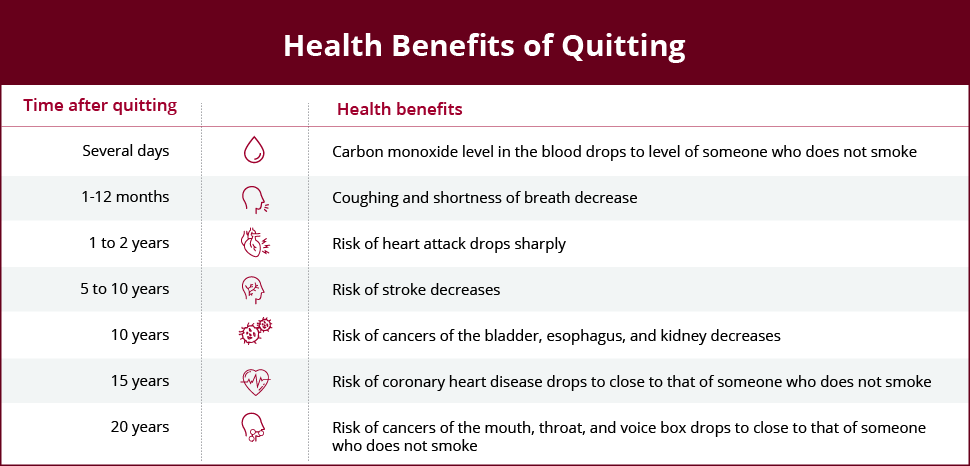In our online EX Community, members who have smoked for 30 or more years often ask “is it too late to quit smoking?”
EX Community member Kikison08, for example, writes, “I feel like it’s too late for me. I keep trying and failing then I am angry at myself, which only makes everything worse.”
We see similar stories like this from other members who believe it might be too late for them, given how long they’ve smoked and how entrenched they are in their addiction.
But the fact is that it doesn’t matter how long someone has been smoking, what health issues they have, or how old they are—it’s never too late to quit. The tens of thousands of people who have quit successfully using the EX Program are evidence of this.
Why it’s never too late to quit smoking
According to the 2020 Surgeon General’s report on smoking cessation, the improvements in health and quality of life that come with cessation mean that quitting is beneficial at any age. In fact, quitting smoking can add as much as a decade to life expectancy.
And as nonsmoking time goes on, so do the benefits. According to Mayo Clinic, a year after quitting, a person’s risk of coronary heart disease is cut in half, and 5 years out, stroke risk is reduced to that of a nonsmoker.
Mayo Clinic also notes that when given the chance, the body is remarkable in its ability to repair and restore itself. If given a long enough time without tobacco, the body essentially reverts to that of someone who has never smoked.
What works to help people quit
If there was a one-size-fits-all quitting method, far more people would be successful in their quit attempts every year. Yet many smokers think if they fail, then they’re the problem. This is simply not true.
What works is evidence-based support, according to the latest Surgeon General’s report, but many smokers attempt to quit without those resources.
For example, although most cigarette smokers try to quit at least once each year, less than one-third use cessation medications approved by the U.S. Food and Drug Administration or behavioral counseling to support quit attempts.
As part of an evidence-based treatment, here are components proven to work to help tobacco users quit:
- Text messaging support is independently effective in increasing smoking cessation rates, particularly if they are interactive or tailored to individual text responses.
- Internet-based interventions increase smoking cessation and can be more effective when they contain behavior change techniques and interactive components.
- Combining short- and long-acting forms of quit medication increases smoking cessation compared with using single forms of quit medication.
The EX Program checks all these boxes and more.
Learn about the EX Program
The EX Program is an Internet-based intervention that offers interactive text messaging and home delivery of nicotine patches, gum, or lozenges.
Our EX Coaches are very familiar with helping people overcome long-entrenched addictions. Plus, we offer an active online EX Community that provides peer-to-peer support, which can be a lifeline for those who believe they’ve run out of chances.
In our EX Community, members share when they are struggling, but there are also tales of success, like member RoseH.
She smoked for almost 50 years and still managed to kick the addiction. At age 75, she notes that her doctor is amazed by how much her health has improved, which means it’s never too late to quit.
“If this ‘old chimney’ can stop, so can you,” she writes. “It is so much easier to quit with others giving invaluable support!”
To learn more about the EX Program, please visit our Program page.





